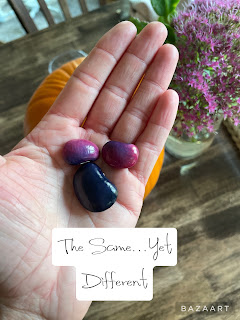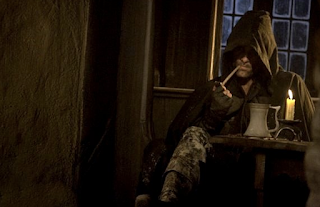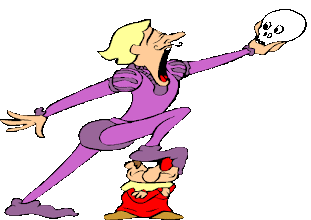This week we're supposed to talk about an iconic scene from a book or movie or show that galvanized us and influenced our writing. I'm going to make it easy. It's the fight scene from The Princess Bride. Okay wait. Maybe the Iocaine Powder scene. Okay. Maybe the whole movie. (It really is the fight scene - the fight choreography and the quick quips and one-upsmanship.)
Then I'm going to leave it there to relay the images etched into my brain after Hurricane Ian came ashore yesterday. The family and I are fine. We were incredibly lucky. Ian came over us as a weak Cat 3 and we never got hit with the eye wall where the strongest winds were. Still, we're shaken. The torrential rain and the wind we had (top gust clocked at 97mph nearby) was more than enough to cast fear into all of us. The worst part was watching the news streams of the monster storm destroying places I know and love - long ago, we declared the key lime pie at RC Otters on Captiva Island the best we'd found in Florida. The Ding Darling Wildlife Reserve on Sanibel Island was unmatched for wildlife spotting hikes. Yesterday, I watched those islands vanish beneath 18' of the Gulf of Mexico in real time. Yesterday, in real time, I watched while water swept into Fort Myers up to the roof line of single story homes. The friend who lives there and I checked in with one another just as Ian was approaching. She and her elderly mother hadn't been able to leave the area. They were at 11' of elevation. Storm surge was 18'. I haven't been able to raise her.
The worst part (for me) is that storm shutters turn homes into dark, blind boxes. It's as if you've taken shelter inside a ready-made tomb. You know weather is going to hell in a hand basket, but you can't see anything. If you can't see anything, you can't begin reacting until it's already far too late. Maybe that would always have been true - that even if you did see something bad coming (storm surge, for example) you aren't likely to be fast enough or have the option to change the situation. This may be one of those 'tell me you're a boater without telling me you're a boater' cases - I'm trained by boating to live with the illusion that if I see a bad situation developing I can mitigate it if I think and act quickly enough. I'm not sure storm surge has gotten a copy of that memo.
I'm privileged.
I slept in a dry bed last night in a house where the power never went out. Entirely. The worst privation we suffered was losing internet and cable TV. That felt bad enough because we couldn't go on keeping tabs on the storm and the people out there in it. But this morning, I could go outside. It was still windy. The rain had stopped. My climbing roses had beaten themselves to shreds. All the leaves are gone. The canes are shreds. A neighbor lost a tree. My oak tree is leaning and will have to be removed. The plants at the front of the house are all laid down to the south. The plants on the south side of the house are all laid down pointing due west. Part of our downspouts ended up in a neighbor's yard. My feral cat (who I desperately tried to catch before the hurricane came ashore) showed up for breakfast this morning. There are bright spots.
Because there was so little damage, I left to salvage what remains of the vacation that Ian nearly preempted. As we drove north out of the swath of Ian's destruction, vast caravans of rescue equipment and supplies passed us, heading south into the heart of the devastation. My chest hurts. I want to help, too, and have no skills to do so. I want to find my friend. And I have no skills to do so. And I'm afraid of what I'd find. It's a very mixed up place to be: Aware that but for the grace of the gods there go I, because if Ian had drifted a few miles north . . .; sad for all that's been lost, guilty for going on vacation, and relieved that my extended family in the area are all safe. There's no good or easy way to make the early part of this week okay. It won't be okay for a very long time. For some people, it will never be okay again.
Three of the four of us in the house had never been in a hurricane before and the one who had admitted that his previous experience had left him with an offhand attitude about what hurricanes were. Until now. For context, Hurricane Charlie - the last hurricane to take the same path ashore. It hit in 2004. The entirety of Hurricane Charlie fit inside the eye of Hurricane Ian.















%20(15).png)












